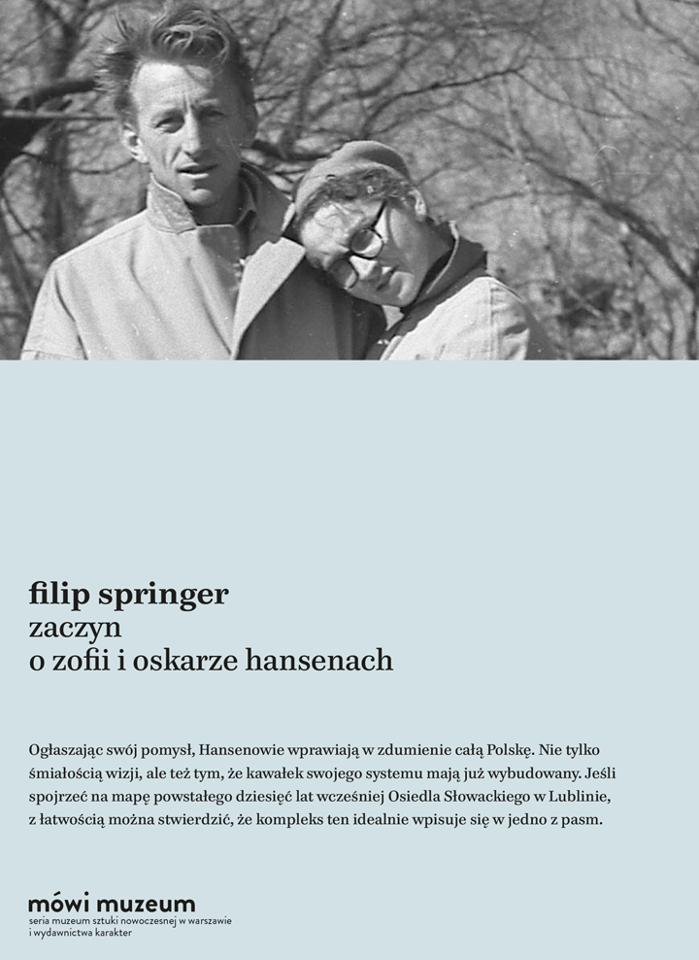 ?Blueprints. The Life and Work of Zofia and Oskar Hansen?
?Blueprints. The Life and Work of Zofia and Oskar Hansen?
Zaczyn. O Zofii i Oskarze Hansenach, reportage,
Karakter 2013, 264 pages,
ISBN 978-83-62376-24-7
A brilliant biographical reportage about a pair of visionary Polish architects, who lived and worked in the People?s Republic of Poland. The history of Oskar Hansen and his family could serve as basis for a movie scenario: the son of a Norwegian and a Russian spends ww ii in Vilnius, where he joins the Polish partisan movement; after the war he studies architecture. During a scholarship in Paris he works for Jeanneret, he gets to know great painters like Picasso, whom he gives some valuable advice. Despite offers to stay in the West, he returns to Poland where he and his wife Zofia work as architects and develop the idea of the Open Form. Their designs are bold, unusual and suited to the needs of ordinary people ? who would object to having a flat made to measure? Alas, in the bleak reality of communist Poland their ideas undergo modifications beyond the architects? control. The outcome is e.g. the ill-named housing estate Przyczółek Grochowski in Warsaw, a place you do not choose, but are sentenced to. This is where Filip Springer, the author of the book decides to settle. He wants to know what it is like to live in a place where the theories of the Hansens were implemented, and to understand, why their innovative ideas did not quite work out in reality.
Springer writes about original personalities, extraordinary human fate and brave architecture, as well as about our mentality. About a vision of saving the world based on faith in man and a sense of duty towards others, and the lack of such a vision in today?s world. An engaging, thought-provoking book.
Reviews:
“”Blueprints” is in some sense an appendix to ?Ill Born?, and also a personal tribute to Hansen, who could have become an architect at the level of Le Corbusier, but who, at the threshold of a great career in the West, chose to return to Poland, explaining,?There are ruins there; they?re waiting for me?.Hansen was always an idealist.He preferred to build new homes for the New Man in Poland.”
– Maciej Robert, Tygodnik Polityka
?What is extraordinary in this book is that although Filip Springer is supposedly writing about a different epoch, the theories of open architecture ? in contrast to the culture of the market, developers, and the creative ego ? have still not lost their teeth.Once again, Springer has succeeded in complicating the image of Communist Poland and its architectural and ideological heritage, and provoking another look at it.?
– Aleksandra Lipczak, culture.pl
?Filip Springer has portrayed a man who is lost in fervour, devoid of any instinct for self-preservation, who seems oblivious to political and social changes, who is slowly excluded from social life, and who does not lose faith in the validity of the premises of LSC. Springer peered into cabinets and under carpets, extracted from Hansen?s colleagues the nasty affair surrounding his removal from the university, and from Andrzej Osęka the withdrawal and destruction of the home-modernist work of art by both architects.”
– Agnieszka Marchewka, Instytut Książki
?Blueprints?? can also be read as a story about the loneliness of people who try to change the world and who believe in the inherent goodness of others. The Hansens were not only the creators of unique architectural ideas; they also overflowed with a humanist faith in progress and people.?
– Bernadetta Darska, onet.pl